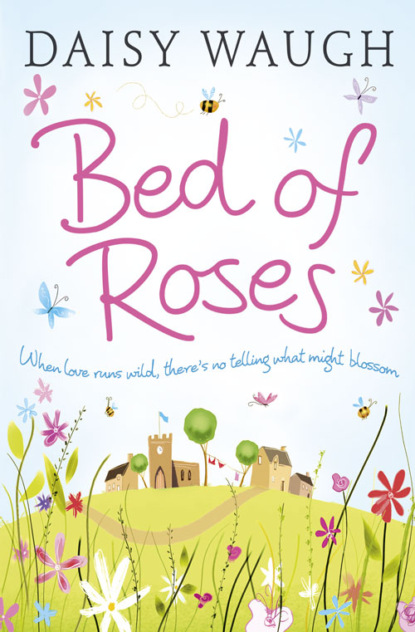По всем вопросам обращайтесь на: info@litportal.ru
(©) 2003-2024.
✖
Bed of Roses
Автор
Год написания книги
2019
Настройки чтения
Размер шрифта
Высота строк
Поля
‘And I would love, Miss Flynn, if you will have me, to put two mornings of my week entirely at your disposal! How does that sound to you?’
Fanny says, ‘Well, thank you. Sounds like a good idea. It’s always welcome when parents lend a helping hand. Shall we say Monday and Friday mornings then, for extra reading? Does that suit you?’
‘Erm – I – yes.’ She is disappointed. After all, to give up two mornings every week for the State Education System in general is quite a thing; it’s quite a sacrifice. Fanny, she thinks, might have shown a bit more appreciation of that fact. ‘Yes, I imagine Mondays and Fridays—But, no. Let me think. I’ll need to confirm that. Fridays can be difficult. The office tends to heat up before the weekends.’
‘OK, just let me know,’ says Fanny, pushing her chair back and standing up, unable to bear being in such a confined space with two such odious people for a single moment longer. ‘Any days would suit me. I can work around you. Give me a call when you’re certain and we’ll get the police check in motion. But you know, it takes so long. Between you and me, you can start next week.’ Fanny smiles as warmly as she can, and holds out her hand.
Geraldine stiffens with annoyance. After all, she isn’t any old bored mum, looking for something to do with her bloody time. Doesn’t Fanny realise that? Doesn’t she realise that Geraldine Adams used to earn a great deal more money than Fanny Flynn ever has or ever will? Doesn’t she realise—
‘That,’ says Robert, ‘is a truly fabulous offer. And thank you, Geraldine. From the bottom of our hearts. Thank you, thank you, thank you! I know how busy you are, and I know what a tremendous sacrifice this must be for you.’
‘Oh, no, really, not at all.’
‘And when people like you can manage to take time out of their busy schedules to support their kiddies’ schools—’
‘No, honestly.’ She glances significantly at Fanny.
‘Thank you,’ Robert says again.
‘Stop! I’m just doing what I can. After all, we’re all on the same side, right?’
‘Oh, yes,’ agrees Robert. ‘Absolutely.’
She puts two thumbs in the air, cocks her head: ‘WE’RE JUST DOIN’ IT FOR THE KIDS!’
‘That’s right,’ Robert nods. ‘Kiddies first! Every time!’
Geraldine keeps the head cocked, offers the two of them a raised eyebrow, a winsome smile.
‘Super,’ says Robert. ‘Well, Geraldine, if that’s all, I know Fanny and I should be getting back to our young students.’ He lifts himself up from the radiator and, with one soft hand on her shoulder, shepherds Geraldine towards the stairs. ‘Thanks ever so much for dropping by. Lovely to see you! And send my regards to Clive, won’t you?’ Geraldine assures him that she will, though she won’t. Of course. Clive wouldn’t have had the faintest idea who she was talking about.
Robert White stands at the top of the stairs, smiling and waving until she is out of view. Afterwards he doesn’t quite dare to return to Fanny’s office. Some sense of personal preservation sends him instead to the toilet to wash his hands, where he finds that he can’t stop grinning. Maybe he rushed her a little there, he thinks, but there’s a chink, and he feels it; a chink of light in the tunnel of love; a teeny-tiny seedling from which something special and beautiful might yet grow.
Robert disposes neatly of his paper towel, checks his fingernails, and heads out to his classroom, where he orders the children to mark their own maths books and then switches a video on.
The video is called Are We Being Served? An Overview of Service Industries in the West Midlands and they have seen it many times before.
15 (#ulink_d803f396-7070-5a71-afdf-5b9b2f2016c8)
Robert White’s previous hostility, his fluey colds, are all forgotten now. He turns up to work every day. He follows Fanny around the school like a puppy. She spoke to him only once, on the afternoon following the incident. She made it clear (she thought) that she never wanted anything similar to happen again. But he’d wandered off with the same serene smile stuck on his lips and it’s been stuck there, now, for a week. No matter what she does. No matter how much she snaps and snarls and ignores him. She can’t shift it.
The little interlude in Fanny’s office has been re-shot in his mind, in softest focus and from all conceivable angles; it’s been given a soundtrack, and a whole lot of dialogue that was never there. He’s taken home the photograph from the Gazette, cut it out and stuck it on to sugar paper stolen from the school stationery cupboard. And this morning he brought pink roses into the staff room.
He made a tremendous drama of arranging them in a broken coffee mug.
‘They’re lovely,’ gushed Linda Tardy; gushed Mrs Haywood. They called in Tracey Guppy from washing the floor next door to have a look.
‘Bet you wish you had a young man giving you roses like that!’ said Linda Tardy. ‘I know I do!’
‘They’re revolting,’ Tracey said.
Fanny, face buried in a newspaper, gave a muffled snort.
‘Do you like them, Fanny?’ said Robert, jiggling them ineptly about. The stems were too long for the mug, and they wouldn’t balance.
‘Hey, Tracey,’ said Fanny (ignoring Robert), ‘I spotted your naughty brother Dane in the post office yesterday. He didn’t look very ill to me. Any chance he might come back to school one of these—’ She looked round from behind her newspaper, but Tracey had left the room. ‘Tracey?’
‘Ouch!’ Robert’s mug of pink roses tumbled to the floor. He looked across at Fanny, pale eyes damp with yearning, a spot of red blood sprouting from his finger. ‘I think I’m going to need a plaster.’
‘Oh, belt up,’ Fanny snapped.
‘Have pity on him!’ giggled glass-eyed Mrs Haywood, as Fanny slapped down her paper and stood up to leave the room. ‘The man’s soft on you, he can’t help it. He can’t concentrate on a thing!’
Through all this nonsense Fanny continues to work hard at her new job, and already the school is beginning to blossom. At least, there is a clear sense of energy to it now. The walls are covered in the children’s artwork and poetry, and there are nature displays on the tables. She has made a small garden at the side of the school, where the junior class has planted flower and vegetable seeds. Last week her car hit one of the Maxwell McDonald pheasants, so she brought the bird in and dissected it for everyone, which was illegal on Health and Safety grounds, but popular with the children. Next week she wants to take them all out collecting wool. Together (the plan is) they will learn how to wash it, spin it, dye it, and weave it into scarves.
Fanny thinks of her school all day and most of the night. In the three weeks since term started she’s had dinner a couple of times with Grey and Messy McShane. She’s met Charlie, Jo, the twins and the General in the Fiddleford Arms for a weekend lunch. (They’d been unable to invite her to the Manor; one of their more troubled celebrity guests being so afraid of spies he’d demanded that even the post be left at the bottom of the drive.) Fanny’s spent a couple of evenings on her own in the pub, chatting with Tracey and anyone else around (although she tries to avoid drinking with Kitty). And she gossips with Mrs Hooper for at least twenty minutes every morning, when she buys her milk and newspaper. But that, excepting the weekend Louis came, makes up the sum total of Fanny’s Fiddleford social life to date. For someone so naturally gregarious, it’s not much. And yet Fanny hasn’t felt lonely for more than the odd few minutes in all that time. She’s been so wrapped up in her work, and so exhausted by the end of each working day, often she can barely find the energy to talk to Brute, let alone to a human being.
Her evenings tend mostly to be dominated by the government forms: the progress reports, policy papers, target statements, assessment charts and time-allocation forecasts all growing steadily damper under her kitchen sink. It seems the more forms she fills in, the more they pile up, so that her desk at work and the kitchen cupboard are now stuffed and overflowing. And at night, even in her dreams, Fanny finds herself ticking boxes, evaluating performances, identifying ethnic origins, searching – endlessly – for that magical square which says ‘other’.
Only two things worry her more than the paperwork: that Dane Guppy hasn’t appeared at school since Fanny and his enormous mother had their disagreement at the limbo over a fortnight ago; and that Scarlett Mozely, Kitty’s daughter, hasn’t produced a piece of work or said a single word to Fanny, or to anyone else, since term began.
Scarlett sits at the back of the class with her crutches lying neatly beside her, as she sits everywhere in life, plain and silent and mostly ignored. She’s been sitting at that same desk, with that same sullen face, ever since Kitty moved to Fiddleford, and until now no one has ever made more than a token effort to disturb her.
Mrs Haywood the glass-eyed secretary tells Fanny she has been unable to ‘locate’ any notes on Scarlett Mozely in either her office or Fanny’s, which is no surprise since the notes on at least a third of all of Fiddleford’s thirty-eight pupils have been missing for years. Robert White is equally unforthcoming when Fanny finally summons the strength to ask him for help.
They are in the staff room at the time, and not alone. (Fanny takes care that they are never alone.) He’s chuckling self-consciously over something in the Guardian, and Fanny is in the far corner, as far away from him as possible, with her back to him, making coffee.
‘Robert,’ she barks. ‘Tell me what you know about Scarlett Mozely.’
‘Mmm,’ he says happily, pretending to think about it but really only trying to make the conversation last, ‘mmmm…No, I must say I don’t know much about Scarlett, I’m afraid, Fanny. She arrived straight into Mrs Thomas’s class.’
‘Yes, I’m aware of that.’
‘Mmm. So your best bet, Fanny, would probably be putting a call in to Mrs Thomas.’
‘Mrs Thomas doesn’t return my calls, as you know. And this is a small school. I presume you’ve had some dealings with her?’
‘By the way, Fanny, I’ve been meaning to ask you, have you ever been on the Eurostar?’
‘What?’
He tells her about a trip to Paris he took ‘with a certain lady-friend. Call me an old devil, but what with recent events I’ve actually misplaced her name!’ He asks Fanny to forgive him for quoting the old maxim, ‘But Paris,’ he says, ‘really is the most romantic city in the world!’
Linda Tardy, eating McVitie’s on the ink-stained sofa, shakes her head. ‘I think you two would make a super couple,’ she says, ‘both being so brainy and international and everything. Wouldn’t it be lovely, Mrs Haywood? Don’t you think?’
‘Linda,’ Fanny says briskly, ‘tell me. What do you know about Scarlett Mozely?’
‘Well…To my experience,’ Linda Tardy replies, after an incredibly long pause, during which she finishes her biscuit – and thinks, presumably, ‘she’s one of these busy ones who likes to buzz away at her own little projects. Doing her own thing. And who am I to say she shouldn’t? Poor little mite.’











